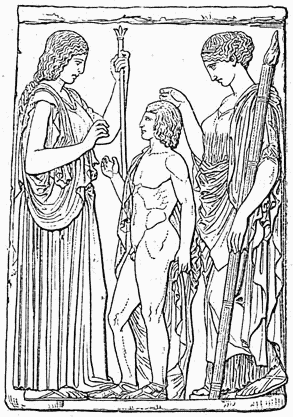When Persephone returned to her mother from the underworld, and Demeter grew happy once more, she came back to Eleusis.
First Demeter showed Triptolemus and others how to conduct religious rites in her honor, and she taught them her mysteries. These mysteries filled mortal humans with awe when they were initiated into the cult of Demeter. And any one who was initiated into the Mysteries at Eleusis ever told about them, for deep awe of Demeter and the other gods and goddesses stopped them from speaking. Happy is the mortal among all humans on earth who has seen these mysteries; and those who are initiated into the religion may hope for better things when they finally die and go the underworld with Hades. As for those who were never initiated into the Mysteries of Eleusis — once they die, they could count on having nothing good down in the darkness and gloom of the underworld.2
Then Demeter had Triptolemus bring wheat to all humankind. She went to the stable where she kept her pair of dragons, also known as the Sacred Serpents. She harnessed them to her chariot, and drove from the stable back to Triptolemus. Demeter gave him seed to scatter all over the world, telling him to sow the seed partly in land that had never been farmed before, and partly in farm fields that had been lying fallow since the beginning of the famine.

Above: Demeter, Triptolemus, and Persephone (l-r) celebrating the Eleusinian Mysteries. Demeter hands Triptolemus the sheaves of wheat, while Persephone blesses them. A 19th century drawing of a marble relief from 5th C. B.C.E. Continue reading “Epilogue: Demeter and Triptolemus”
